If you’ve ever had your car’s spark plugs changed, you may have noticed that there is oil on them. You may have even asked your mechanic about it and been told that it’s normal. But why is there oil on my spark plugs?
Spark plugs are one of the most important parts of your engine. They create the sparks that ignite the air/fuel mixture in the cylinders, which in turn powers your car. Over time, they can become fouled with deposits from the combustion process, and will need to be replaced.
Oil on Spark Plugs? Diagnose and Fix Spark Plug Tube Seals!
Oil in your spark plugs can be caused by a few different things. The most common cause is worn piston rings. When your piston rings are worn, they allow oil to seep into the combustion chamber and get on the spark plug.
This can also be caused by a leaking valve cover gasket or a faulty PCV valve. If you notice oil on your spark plugs, it’s important to get it fixed as soon as possible. Oil on the spark plug can cause misfires and damage to the catalytic converter. If you’re not sure what’s causing the oil in your spark plugs, take your car to a mechanic and have them check it out.
Effects of Oil on Spark Plugs
When oil enters the combustion chamber, it can coat the spark plugs and interfere with their ability to produce a strong spark. The oil can cause the spark plugs to misfire or fail to ignite the air-fuel mixture properly, resulting in a loss of engine power and decreased fuel efficiency.
Additionally, oil on the spark plugs can lead to fouling, which can further deteriorate their performance. The presence of oil on the spark plugs may also indicate a more serious underlying issue with the engine, such as worn piston rings or valve seals. If the problem is not addressed, it can lead to more severe engine damage over time.
Regular maintenance, including checking for oil leaks and replacing worn seals and gaskets, can help prevent oil from affecting the spark plugs and ensure the proper functioning of the engine. If oil deposits are found on the spark plugs, they should be thoroughly cleaned or replaced to restore optimal engine performance.

Is Oil on Spark Plugs Bad
If you’re a car owner, you know that oil is an essential component of your vehicle. But did you know that oil can also be bad for your car? That’s right – oil on spark plugs can actually damage your engine and lead to costly repairs.
So what exactly happens when oil gets on spark plugs? Well, it can cause the plugs to misfire, which in turn can damage the engine. Oil can also cause the plugs to foule, which means they’ll need to be replaced more often. In extreme cases, oil on spark plugs can even cause engine fires. So how do you prevent this from happening? The best way is to regularly check your spark plugs and make sure they’re clean.
If you see any oil residue, wipe it off with a cloth or paper towel. You should also avoid using too much oil when changing your own oil – just enough to lubricate the filter is all you need. By following these simple tips, you can help keep your engine healthy and free of costly repairs. So don’t forget to check those spark plugs!

Credit: www.youtube.com
How Do You Fix Oil in Spark Plugs?
If you’re noticing that your engine is misfiring, it might be due to oil in the spark plugs. This is a common issue that can be easily fixed. Here’s how:
1. Remove the spark plug from the engine. You’ll need a ratchet and spark plug socket for this.
2. Inspect the spark plug to see if there’s any oil on it. If so, wipe it off with a clean rag or paper towel.
3. Re-install the spark plug and tighten it with the ratchet until snug. Do not over-tighten!
4. Repeat steps 1-3 for each of the remaining spark plugs. 5. Start up the engine and see if the misfire has been fixed.
How to Clean a Spark Plug
To clean a spark plug, start by removing it from the engine using a spark plug wrench. Inspect the electrode at the end of the plug for any carbon deposits or dirt. Use a wire brush or emery cloth to gently scrub away any buildup, being careful not to damage the electrode itself. If the buildup is stubborn, you can use a small amount of gasoline or a specialized spark plug cleaner to help break it up. Once the electrode is clean, use compressed air to blow out any debris from the plug.
Check the gap between the electrode and the porcelain insulator and adjust it as necessary using a gap tool. Once the spark plug is clean and the gap is correct, it can be reinstalled in the engine using the spark plug wrench. Regular cleaning of spark plugs can help improve engine performance and fuel efficiency, so it’s a good idea to check and clean them periodically.

Can I Drive With Oil in My Spark Plugs?
If your car has oil in the spark plugs, it’s likely due to an oil leak. The most common cause of an oil leak is a faulty valve cover gasket. A leaking valve cover gasket can allow oil to seep into the spark plug wells, and if the plugs are not tightened properly, oil can also enter the combustion chamber.
Driving with oil in your spark plugs is not advisable as it could lead to engine misfires and damage. If you notice that your car has an oil leak, get it checked out by a mechanic as soon as possible so that they can replace the gasket and prevent further leaks.
How Often Do Spark Plugs Need to Be Replaced?
Spark plugs typically need to be replaced every 30,000 to 50,000 miles, or every 2-3 years. However, this can vary depending on the type of spark plug and the specific driving conditions. For example, iridium or platinum spark plugs may last up to 100,000 miles, while copper spark plugs may only last around 30,000 miles.
Additionally, if you frequently drive in stop-and-go traffic, tow heavy loads, or often drive at high speeds, your spark plugs may need to be replaced more often. It’s important to consult your vehicle’s manual or a trusted mechanic to determine the appropriate replacement interval for your specific make and model of vehicle.
Neglecting to replace worn-out spark plugs can lead to decreased fuel efficiency, engine misfires, and overall reduced vehicle performance. Regular maintenance and timely replacement of spark plugs can help ensure that your engine runs smoothly and efficiently.

Frequently Asked Questions [FAQs]
What causes oil in my spark plugs?
Oil in your spark plugs can be caused by several factors, including a faulty o-ring, a leaking head gasket, or excessive oil consumption in the engine.
How does oil on a spark plug affect the engine?
Oil on a spark plug can lead to misfiring, rough idling, and a decrease in engine performance. It can also cause blue smoke to emit from the exhaust.
What are the common symptoms of oil in a spark plug well?
Common symptoms of oil in a spark plug well include difficulty starting the engine, rough idling, and decreased fuel efficiency.
How can I prevent oil from getting into my spark plugs?
Regular oil changes and proper maintenance of engine components such as o-rings and spark plug threads can help prevent oil from seeping into the spark plugs.
What are the consequences of having oil on spark plugs?
Oil on spark plugs can lead to decreased engine performance, increased emissions, and potential damage to the spark plug and ignition system.
How can I remove oil from my spark plugs?
To remove oil from spark plugs, the affected spark plug wells should be cleaned using a suitable solvent and the underlying cause of the oil leakage should be addressed.
Conclusion
Oil in your spark plugs is not a good thing. It can cause all sorts of engine problems, and it’s generally just a pain to deal with. Oil can get into your spark plugs for a variety of reasons, but the most common one is simply due to bad valve seals.
When your valve seals are worn out, oil can leak past them and end up in your combustion chamber. This is especially true if you have high mileage on your car. If you’re noticing oil on your spark plugs, it’s important to get it fixed as soon as possible. Ignoring the problem will only make it worse and could eventually lead to engine damage.
